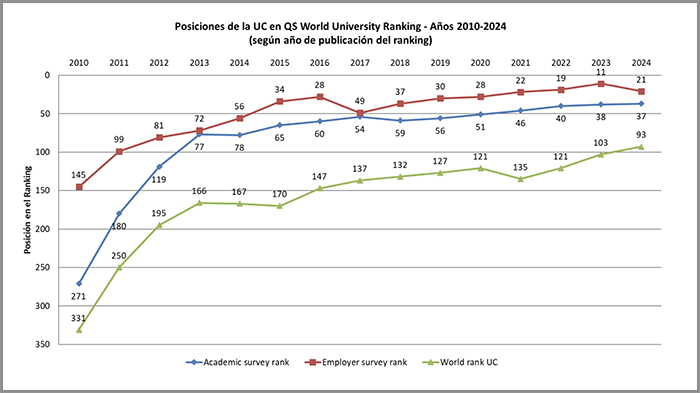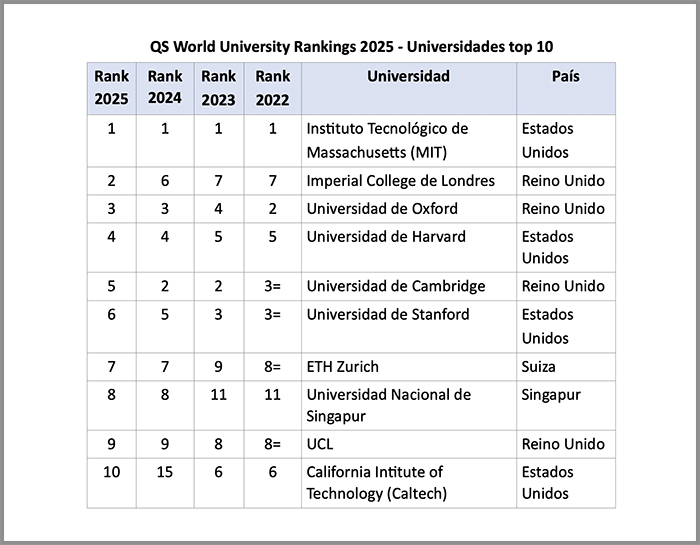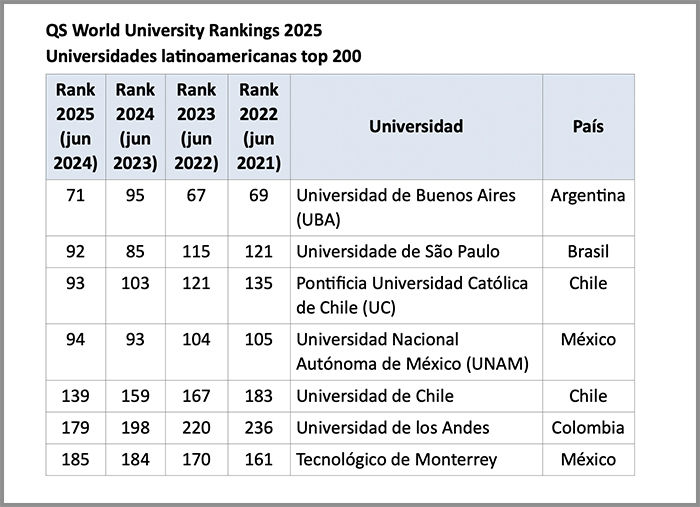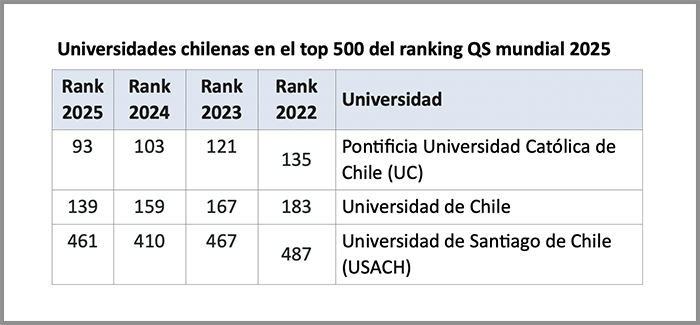
UC Chile Ranked Among Top 100 Universities Worldwide, Achieving Goal 14 Years Ahead of Schedule
27 June 2024
UC Chile continues to shine in the QS Rankings 2025 and is now among the world's top 100 institutions. The university’s main strengths continue to be academic reputation, employer reputation and also excels in employment outcomes, ranking 12th worldwide in this last area.

photo_camera As one of the top 100, the UC Chile ranks within the top 6% of institutions worldwide. Photo Office of Communications.
In the 21st edition of the QS World University Rankings 2025, UC Chile placed 93rd worldwide. The university leapt 10 spots in the international rankings, as compared to the previous year (103rd). As one of the top 100, UC Chile ranks within the top 6% of institutions worldwide.
In recent years, the university has shown strong and sustained progress in the rankings of the prestigious British company Quacquarelli Symonds (QS). Rising from 331st place in 2010, it has firmly secured the 93rd position in just 14 years.
This year, QS analyzed 5,663 universities from 106 countries and ranked 1,503 of them. Among these are 25 Chilean institutions, including 21 newcomers to the ranking.
UC Chile's favorable position is primarily based on its reputation among both academics and employers. These surveys place UC Chile at 37th in academic reputation and 21st in employer reputation globally.

University President: "We Have Achieved This Goal 14 Years Ahead of Schedule"
UC Chile President Ignacio Sánchez expressed his satisfaction with this great news, stating, "We are filled with joy and satisfaction, as this achievement recognizes the collective efforts of our entire university community." He added that the combined efforts of professors, undergraduate and graduate students, professionals, and administrative staff have resulted in a cohesive and sustained improvement in the quality of UC Chile's teaching, undergraduate and graduate education, creation of new knowledge, research, and societal impact.
“We are filled with joy and satisfaction, as this achievement recognizes the collective efforts of our entire university community.” - President Ignacio Sánchez
Share
He also emphasized the significance of the employability indicator in the ranking, highlighting how both the public and private sectors actively hire UC Chile graduates across all fields, as well as the high quality of the academic staff in terms of their education and performance.
The president highlighted the University’s significant strides in sustainability and prominent role in the climate agenda and socio-environmental issues, driven by its institutes, departments, and centers. President Sánchez pointed out the need for continued development in research and transfer through publications, projects, patents, and new ventures, and the subsequent need for more support to make these types of projects possible. "The ideas and proposals are there; what we need is the resources to carry them out," he said.
“When the vision was cast in 2008 for the university to break into the top 100, the target was initially set for 2038, coinciding with its 150th anniversary. We have achieved this goal 14 years ahead of schedule, opening new horizons and goals for further advancement,” President Sánchez concluded.
Share
Finally, the President noted that this ranking reflects significant growth over the past 15 years. When the vision was cast in 2008 for the university to break into the top 100, the target was initially set for 2038, coinciding with its 150th anniversary. We have achieved this goal 14 years ahead of schedule, opening new horizons and goals for further advancement. Of course, we will continue to improve our standing not only regionally but also globally," he stated.
Provost Guillermo Marshall agreed that being one of the top 100 universities globally is a significant accomplishment, instilling pride and motivating ongoing strides toward excellence at UC Chile. He highlighted that being ranked 93rd in the world is the result of the entire community's work and commitment, which has significantly impacted the strengthening of UC Chile's reputation among academics and employers. The provost emphasized that being part of the top 100, considering there are over 26,000 universities worldwide, is a tremendous recognition of UC Chile's daily work.”

“Being part of the top 100, considering there are over 26,000 universities worldwide, is a tremendous recognition of UC Chile's daily work,” said Provost Guillermo Marshall.
Share
UC Chile Results
According to this year’s rankings, UC Chile’s strengths continue to be academic reputation (93.7/100 points) and employer reputation (98 points). Additionally, it excels in employment outcomes (99.9 points, 12th worldwide).
Among the Chilean institutions considered in the rankings, the university holds the highest position. When analyzing results by indicator, UC Chile holds the top position in the country for academic reputation, employer reputation, employment outcomes, student-to-faculty ratio, international research network, and sustainability.
On a global scale, the 2025 ranking is once again led by the Massachusetts Institute of Technology (MIT), followed by the Imperial College London (previously in 6th place, now ranked 2nd), and University of Oxford (ranked 3rd). Of the top 10 universities in the world, four are from the United States, four from the United Kingdom, one from Switzerland, and one from Singapore.

In Latin America, the best-ranked institution is the Universidad de Buenos Aires, placed 71st globally (24 positions higher than in the previous ranking). This institution surpassed the Universidade de São Paulo (which fell from 85th to 92nd place). In third place is UC Chile, 93rd globally (10 positions higher than the previous year). In total, 190 Latin American universities were ranked, but only 7 are in the top 200 (4 in the top 100).

At the national level, 25 Chilean universities appear in the QS World University Rankings 2025. UC Chile is the only Chilean institution within the top 100 universities worldwide. It is followed by Universidad de Chile, which climbed 20 positions from last year to rank 139th. Universidad de Santiago is ranked 461st, dropping 51 positions from last year.

Background
The British Company Quacquarelli Symonds (QS) has been publishing the QS World University Rankings since 2004. It is one of the most recognized and internationally used university rankings. QS also has developed other reports such as the QS World University Rankings by Subject and the QS Latin American University Rankings, using slightly different methodologies from the global report.
Methodology
The year 2023 QS made significant modifications to the methodology of its global ranking, adding three new indicators to the existing six (academic reputation, employer reputation, faculty/student ratio, citations per faculty, international faculty ratio, and international student ratio). The new indicators introduced this year are international research network, employment outcomes, and sustainability. The incorporation of these new metrics also resulted in changes to the weightings given to each indicator.
Considerations Regarding the Indicators
The reputation indicators are associated with the surveys conducted by QS among academics and employers worldwide. Information on the methodology of these surveys can be found at the provided links.
* The "citations per faculty" indicator measures the average number of citations received by each faculty member based on publications indexed in SCOPUS. This metric aims to estimate the impact and quality of the scientific work produced by universities.
* The faculty/student ratio and the percentages of international faculty and students are based on information provided by the institutions themselves.
* All the indicators are normalized and expressed in relative scores ranging from 0 to 100.
* The International Research Network (IRN)indicator was added in 2023. It evaluates the richness and diversity of an institution's international research partnerships. The IRN is based on the Margalef Index (widely used in environmental sciences) andreflects the ability of institutions to diversify the geography of their international research network by establishing sustainable research partnerships with other higher education institutions.
* The employment outcomes are an indicator introduced by QS in 2023 that measures the institutions' ability to ensure a high level of employability for their graduates while nurturing future leaders who will have an impact in their respective fields. This indicator combines two metrics used in the QS Graduate Employability Rankings: graduate employment rate and alumni impact index, which assesses the presence of successful alumni in various fields (innovation, creation, entrepreneurship, philanthropy, etc.).
* The sustainability indicator is extracted from the QS Sustainability Ranking and assesses the social and environmental impact of universities as centers of education and research.
It is important to note that the QS Global Ranking has a different methodology from the QS Latin American ranking, some indicators used are the same, while others differ. Therefore, when analyzing the position of Latin American universities in the QS Global Ranking, the results may differ from the regional version of the QS ranking.
For more information about the ranking methodology, click here: https://support.qs.com/hc/en-gb/articles/4405955370898-QS-World-University-Rankings
For more information about the ranking, click here: https://www.topuniversities.com/qs-world-university-rankings
For more information about the complete ranking, click here: https://www.topuniversities.com/world-university-rankings




